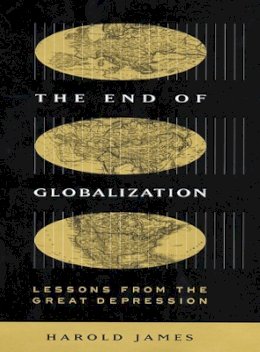
The End of Globalization. Lessons from the Great Depression.
Harold James
"Globalization" is here. Signified by an increasingly close economic interconnection that has led to profound political and social change around the world, the process seems irreversible. In this book, however, Harold James provides a sobering historical perspective, exploring the circumstances in which the globally integrated world of an earlier era broke down under the pressure of unexpected events.
James examines one of the great historical nightmares of the twentieth century: the collapse of globalism in the Great Depression. Analyzing this collapse in terms of three main components of global economics--capital flows, trade, and international migration--James argues that it was not simply a consequence of the strains of World War I but resulted from the interplay of resentments against all these elements of mobility, as well as from the policies and institutions designed to assuage the threats of globalism. Could it happen again? There are significant parallels today: highly integrated systems are inherently vulnerable to collapse, and world financial markets are vulnerable and unstable. While James does not foresee another Great Depression, his book provides a cautionary tale in which institutions meant to save the world from the consequences of globalization--think WTO and IMF, in our own time--ended by destroying both prosperity and peace.
Product Details
About Harold James
Reviews for The End of Globalization. Lessons from the Great Depression.
Barry Eichengreen, University of California, Berkeley, and author of Gold Fetters: The Gold Standard and the Great Depression, 1919-1939. This book is a major contribution to the field of international economic history. It gives us some very powerful insights on the effects of globalization on institution building and destruction. It also provides very detailed and valuable information on the deglobalization experiences of many countries in the interwar period with respect to the breakdown of the financial system and the backlash on international trade and migration.
Michael D. Bordo, Rutgers University James argues that the Great Depression was the result in part of the failure of three institutions that had evolved to handle the consequences of an increasingly globalized world: tariff systems, central banks, and immigration legislation. James also detects modern-day parallels in the popular backlash against the World Trade Organization and NAFTA, the collapse of long-term capital management, and the meltdown of Asian economies. Though he does not foresee another depression, James does warn that another reverse of the pendulum might today threaten both peace and prosperity.
David Rouse
Booklist
Harold James points out one of the more amusing side effects of downturns through history
the countervailing boom in articles about economic crises. His own thesis is less doom-laden than the title suggests, but he points out some telling parallels. The Great Depression ended a long period during which the nineteenth-century technologies of rail, steam, and telegraphy integrated the world's economies as never before.
Leo Carey
New Yorker
Globalization is a hot topic today, and the backlash against the increasing internationalization manifested in protests at recent meetings of the World Trade Organization has attracted considerable public attention. Globalization is not, however, a new phenomenon. The late 19th century saw a pronounced movement toward increased international economic integration. This earlier era of globalization came to a dramatic end during the Great Depression of the 1930s. James explores the history of this earlier episode of globalization to identify lessons for our own age. The core of the book tells the story of the interwar financial crisis and the resulting depression and then traces the paths through which the collapse of monetary and financial institutions led to trade and immigration restrictions and an increased emphasis on national economic policies...[James] provides a clear and accessible version of this story and explicitly focuses on the lessons it offers for the present.
J. L. Rosenbloom
Choice
Students of the inter-war period will certainly be grateful to James for his authoritative, detailed, and elegantly written analysis of policy-making during the Great Depression. He takes in his stride a wealth of recent research, and dissects clearly the dilemmas facing policy-makers as they adopted policies which effectively dismantled the international economy.
English Historical Review
This is a deliberately provocative book...Prof James has useful things to say about the overstretched expectations that have partly crippled the International Monetary Fund and which are relevant to the World Bank and World Trade Organisation...Political leaders everywhere should keep a copy under their pillow.
Richard Lambert
Financial Times
